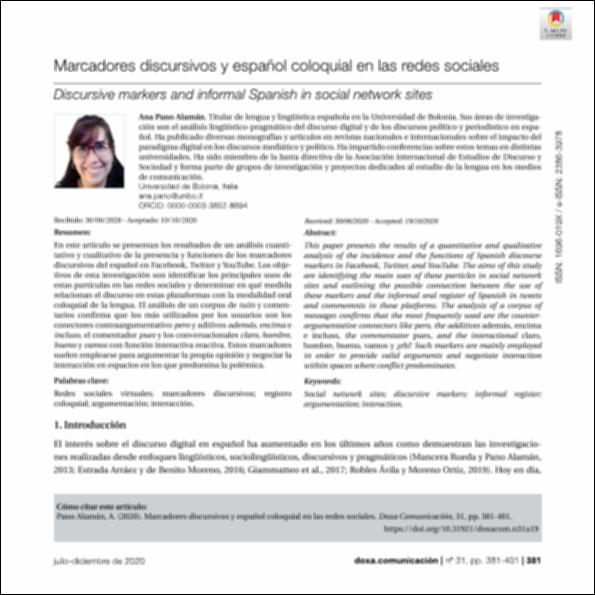Please use this identifier to cite or link to this item:
http://hdl.handle.net/10637/11738Marcadores discursivos y español coloquial en las redes sociales.

See/Open:
es_m8_stamped.pdf
Español
385,29 kB
Adobe PDF
See/Open:
en_m8_stamped.pdf
English
383,96 kB
Adobe PDF
See/Open:
Monografico_8_ES_Doxa_31_Marcadores_discursivos_EPUB.epub
Español
569,05 kB
EPUB
See/Open:
Monografico_8_EN_Doxa_31_Discourse_markers_EPUB.epub
English
562,71 kB
EPUB
| Title: | Marcadores discursivos y español coloquial en las redes sociales. Discursive markers and informal Spanish in social network sites. |
| Authors : | Pano Alamán, Ana |
| Keywords: | Redes sociales virtuales; Marcadores discursivos; Registro coloquial; Argumentación; Interacción; Social network sites; Discursive markers; Informal register; Argumentation; Interaction |
| Abstract: | En este artículo se presentan los resultados de un análisis cuantitativo y cualitativo de la presencia y funciones de los marcadores
discursivos del español en Facebook, Twitter y YouTube. Los objetivos de esta investigación son identificar los principales usos de
estas partículas en las redes sociales y determinar en qué medida
relacionan el discurso en estas plataformas con la modalidad oral
coloquial de la lengua. El análisis de un corpus de tuits y comentarios confirma que los más utilizados por los usuarios son los conectores contraargumentativo pero y aditivos además, encima e
incluso, el comentador pues y los conversacionales claro, hombre,
bueno y vamos con función interactiva reactiva. Estos marcadores
suelen emplearse para argumentar la propia opinión y negociar la
interacción en espacios en los que predomina la polémica. This paper presents the results of a quantitative and qualitative analysis of the incidence and the functions of Spanish discourse markers in Facebook, Twitter, and YouTube. The aims of this study are to identify the main uses of these particles on social network sites and outline the possible connection between the use of these markers and the informal oral register of Spanish in tweets and comments on these platforms. The analysis of a corpus of messages confirms that the most frequently used are the counter-argumentative connectors like pero (but), the additives además (what’s more), encima (moreover) and incluso (even), the commentator pues (well / so), and the interactional claro (of course), hombre (man), bueno (well), vamos (come on) and ¿eh? (eh?) Such markers are mainly employed in order to provide valid arguments and negotiate interaction within spaces where conflict predominates. |
| Description: | En: Doxa Comunicación: revista interdisciplinar de estudios de comunicación y ciencias sociales. e-ISSN 2386-3978 n. 31, 2020, pp 381-401. |
| URI: | http://hdl.handle.net/10637/11738 |
| Rights : | http://creativecommons.org/licenses/by-nc-nd/4.0/deed.es |
| Issue Date: | 11-Dec-2020 |
| Center : | Universidad San Pablo-CEU |
| Appears in Collections: | Doxa.Comunicación nº 031 (2020) Monográfico |
Items in DSpace are protected by copyright, with all rights reserved, unless otherwise indicated.

